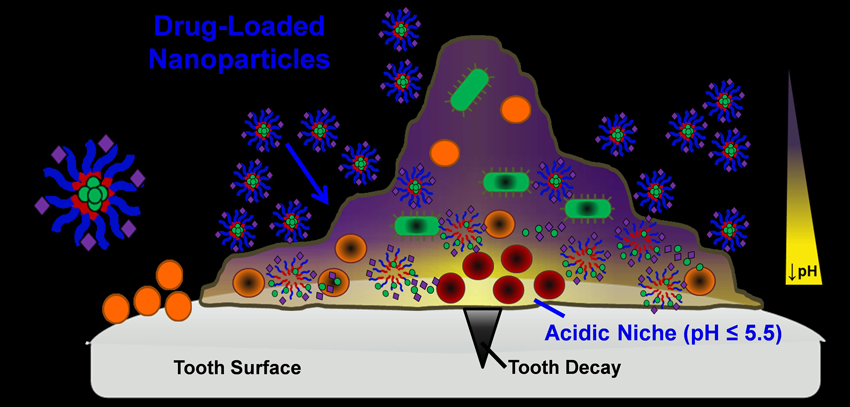URMC / Labs / Benoit Lab / Projects / pH-Responsive Nanoparticle Drug Delivery to Inhibit Oral Biofilm Formation
pH-Responsive Nanoparticle Drug Delivery to Inhibit Oral Biofilm Formation
Project Collaborators:
Dr. Paul Dunman, Hyun ‘Michel’ Koo (University of Pennsylvania)
Tooth decay, often referred to as cavities and known clinically as dental caries, affects over 60% of children and nearly all adults worldwide and costs billions of dollars annually. Each year, dentists across the nation fill more than 200 million cavities!
Tooth decay is a disease caused by bacteria that reside in the human mouth. These bugs live on tooth and gum surfaces within the mouth and can build up to create what is known as an oral biofilm, commonly called dental plaque. This plaque can be quite destructive due to the acids produced as bacteria digest sugars found in the human diet. These acids dissolve the enamel surface covering the teeth, and create small holes that grow to become cavities.
Despite this knowledge, current treatment options using topically applied drugs offer little to no protection. This fact is due to the poor solubility or salivary clearance of drugs as well as a protective barrier created by the biofilm and results in insufficient contact time to kill bacteria on the tooth surface.
Therefore, we are interested in killing these bacteria and preventing the biofilms before they become destructive by leveraging key features of tooth decay pathology, such as the stark drop in pH, in the fight against the bacteria. Our lab works with a team of collaborators to design and test drug delivery systems capable of penetrating dental plaque and releasing antibacterial drugs precisely where cavities develop: the acid-covered tooth surface. Specifically, we’ve developed polymer nanoparticles that can load poorly soluble drugs and then release those drugs due to changes in local pH conditions, such as the acidic environments created by oral biofilms (see Figure 2). In this way, we can deliver the right drug, to the right place, at the right time to inhibit biofilm formation and thus save teeth from the harsh acids that cause decay.

Simplified illustration of pH-responsive nanoparticle drug delivery to an oral biofilm. Polymer nanoparticles co-loaded with two separate drugs release the drugs in response to the changing pH conditions within the biofilm. This drug release under acidic conditions (pH ≤ 5.5) kills the bacteria (represented by black dots within bacteria), thus inhibiting biofilm formation and reducing tooth decay.
Ideally, this research will provide a fundamental understanding of biomaterials and nanotechnology which may lead to a novel toothpaste or mouthwash that leaves a protective layer of drug-loaded nanoparticles on the tooth surface to prevent future bacterial attacks.
« back to all projects